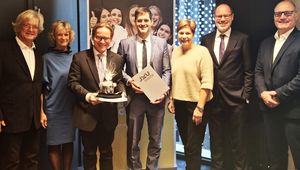At the recommendation of the International Scientific Advisory Board for Medicine (IWBM), the JKU Faculty of Medicine voluntarily took part in an international evaluation.

When it comes to the Faculty of Medicine’s future and continued success, the Commission's recommendations, conclusions, and recommended course of action will set the course.
Chaired by Prof. Dr. Guido Adler (former Chief Medical Director and Chairman of the Board of Heidelberg University Hospital), a team consisting of six international reviewers evaluated the JKU Faculty of Medicine based on a self-evaluation (by means of a standardized questionnaire and on-site visits). Based on these findings, the team compiled a report containing assessments and recommendations regarding the future.
A Successful Initial Development Phase
The evaluation commission believes that the JKU's Faculty of Medicine growth and development to date has been extremely successful.
Launched in 1014, the Faculty of Medicine was an ideal opportunity for the university to drive innovative research projects and studies at the crossroads of medicine, technology, and digital transformation forward, as well as make a conscious effort to complement other Austrian universities that have medical schools. By bringing different perspectives and different disciplines between the faculties together, the university has not only paved the way to pursue new and innovative expertise and advancement, but also focus on finding new approaches to improve our understanding of illnesses and develop innovative treatments.
The international commission believes the interdisciplinary partnership between medicine and other disciplines as a unique ‘selling point’ in Austria, working in favor of choosing to study in Linz, and recommends, among other things, utilizing the available potential to an even greater degree than before, as well as continuing to reinforce the interdisciplinary approach by creating so-called “bridge professorship positions”.
The clinical research institutes are another distinguishing feature, serving as an ideal platform to closely couple base-knowledge research and clinical research, and meet a university goal to incorporate the latest scientific findings directly to patient care. According to the evaluation commission, in addition to neurosciences and cardiovascular diseases (two clinical areas of excellence at the Kepler University Hospital), inflammation and tumor medicine could also evolve into a very promising areas of focus. Close collaboration between the Kepler University Hospital and the Ordensklinikum Linz will serve as a foundation to establish a Comprehensive Cancer Center (CCC) under the direction of the Kepler University Hospital. The JKU's involvement with the inter-university Ignaz Semmelweis Institute (an institute focusing on infectiology) illustrates the young faculty's international aspirations.
The partnership between the Medical University of Graz and the JKU Faculty of Medicine in the area of preclinical education in anatomy is regarded as particularly pioneering. Students who complete the preclinical stage of the medical degree program in Linz are required to attend an anatomical dissection course in Graz as there is no cadaver dissection training in Linz. Education in theoretical anatomy in Linz stands out on account of the virtual anatomy educational concept in the unique JKU medSPACE.
The evaluation commission was also impressed by the way three hospitals under different ownership merged to create the Kepler University Hospital, as well as with the JKU MED Campus (opened in 2021) and constructed on schedule and within the budget with extensive financial support provided by the state of Upper Austria (€104 million).
JKU Rector Stefan Koch remarked: “It can be risky to openly and independently undergo an external assessment, particularly as the Faculty of Medicine was controversial in the beginning, even among experts. The report is all the more encouraging that the commission has confirmed the Faculty’s potential to become a nationally and internationally competitive medical school. I am also pleased that the Commission recognized our interdisciplinary approaches, especially certain topics for the future (such as AI and medical engineering) as a unique selling point when studying medicine in Linz. We will continue to pursue and drive these topics forward, as well as advocate for conducting innovative research that can benefit patients.”
Future Opportunities and Challenges
The evaluation commission feels that the Faculty of Medicine has room to grow and during its next stage of development, the Faculty should focus on research advancements, particularly in an effort to competitively raise its international profile, attract top professors and faculty members, and retain its academic appeal.
The Commission believes one of the Faculty’s biggest challenges is building the academic mid-level faculty. The Commission commends the JKU’s initiative program to create long-term positions (tenure-track professorships) that provide physicians with long-term and reliable professional careers at the faculty. Filling more chairs is considered an urgent matter.
Christine Haberlander, State Minister of Health, remarked: “In Upper Austria, we are working together to improve our state’s healthcare. The JKU Faculty of Medicine is a milestone and an Upper Austrian success story. Right from the start, the Faculty was never an 'ivory tower' of science, but rather about medicine to actually benefit patients. The close proximity to the Kepler University Hospital in terms of location and its facilities demonstrates just how important this approach is when it comes to healthcare in Upper Austria, and the outstanding, well-functioning partnership between healthcare, education, and research. This is proof of our successful, collaborative path. I firmly believe this success story, launched ten years ago, will continue well into the future.”
Elgin Drda, JKU Vice-Rector for Medicine and Dean of the Faculty of Medicine, remarked, “While we are delighted with the commission’s outstanding evaluation, we will continue to look toward the future. The subsequent stages in our growth will be crucial to conveying our scientific excellence and establishing the JKU Faculty of Medicine on a par both nationally and internationally. The commission's report emphasizes outstanding collaboration among the involved parties as a key success factor, and that includes the federal government, the state of Upper Austria, the city of Linz, the JKU, and KUK. I am certain this will continue to be essential in the future and vital to drive our success forward, as we are talking about nothing less than the future of our Faculty of Medicine.”
Dr. Franz Harnoncourt, managing director at the Kepler University Hospital, believes: “The commission’s positive assessment confirms that the Kepler University Hospital is on the road to success and becoming a fully-fledged teaching hospital capable of competing on a par with well-established medical schools. The commission not only recognized how well three independent hospitals merged to become one clinic, but also its technical and technological resources and support, as well as its future-oriented IT infrastructure. In the coming years, additional professorship positions, a solid academic staff, and sufficient resources to conduct research and teach effectively in the classroom will be imperative to support ongoing progress. After all, the Kepler University Hospital can only serve as a maximum healthcare provider in our medical landscape when healthcare, education, teaching, and research work interactively.”
Future Funding will be the Key
While the evaluation commission believes the 2014-2018 budget was sufficient to successfully establish academic operations, it also stated that it believes further funding will be a key issue when it comes to the JKU Faculty of Medicine’s continued success.
Guido Adler, head of the International Evaluation Commission, added: “More financial funding will be needed in order to establish urgently needed additional professorship positions as well as maintain research funding programs. If you compare the JKU Faculty of Medicine’s budget with that at other university medical centers in Austria, we see that in order to be able to function successfully on a national and international level, additional, long-term funding will be required.”
Competitive growth will require the fair distribution of medical university funding. The Faculty of Medicine educates 18% of the medical students despite receiving only 5% of the budget. To date, the Faculty of Medicine has not been financed out of the JKU's global budget, but rather by an agreement in accordance with Art. 15a B-VG. Over the next three years, the Faculty of Medicine will have €199.6 million at its disposal. The agreement period will end after 2027, requiring federal government new funding.
The Commission argues in favor of additional, special funding that would - alongside the other JKU faculties - enable the Faculty of Medicine to continue on a positive trajectory of growth.
JKU Rector Stefan Koch summarized: “The report is extremely positive, showing the Faculty’s growth has been successful and that when it comes to the Faculty of Medicine, the JKU has utilized the available financial resources in the best way possible.”
The evaluation committee believes that with the required additional resources, the JKU Faculty of Medicine has the potential to evolve into a competitive location of university medicine, both in Austria and abroad.
 Go to JKU Homepage
Go to JKU Homepage











